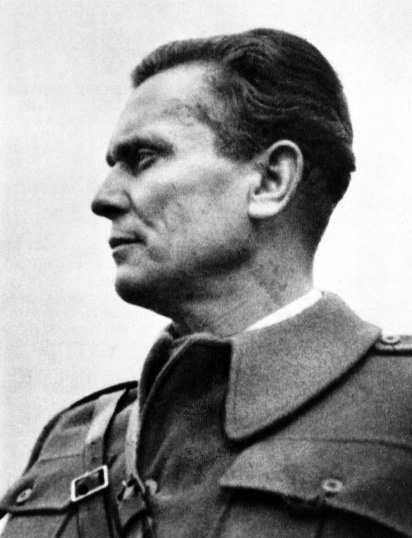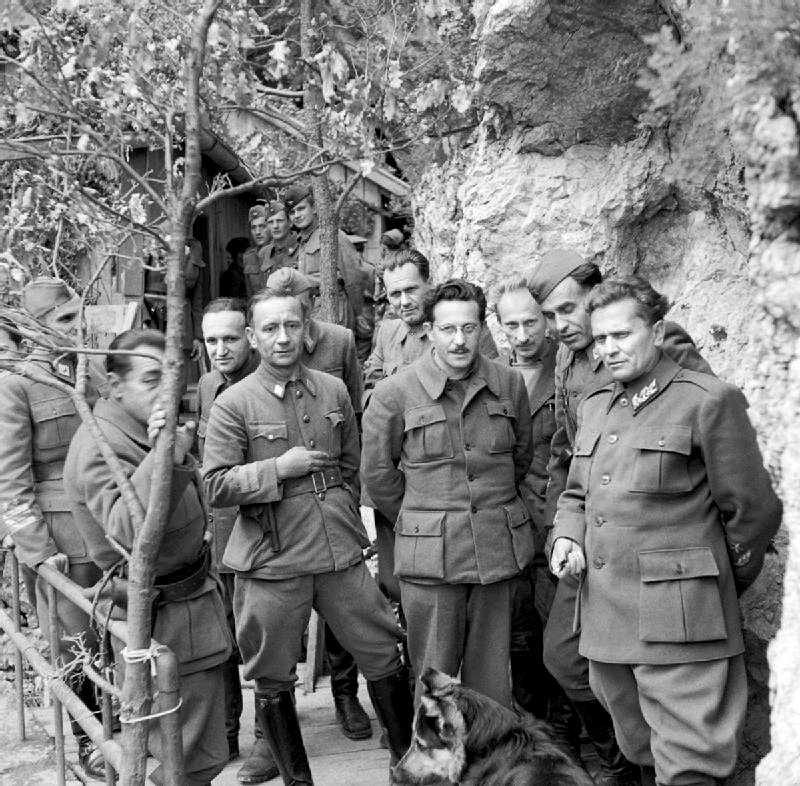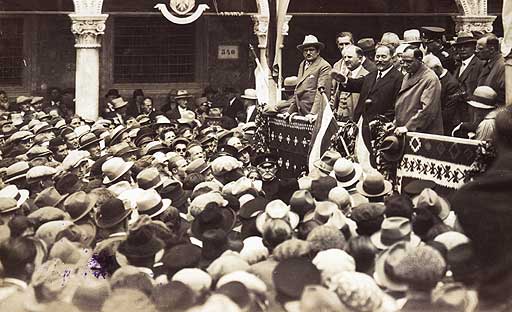|
National Committee For The Liberation Of Yugoslavia
The National Committee for the Liberation of Yugoslavia ( sh, Nacionalni komitet oslobođenja Jugoslavije, sl, Nacionalni komite osvoboditve Jugoslavije, NKOJ), also known as the Yugoslav Committee of National Liberation, was the World War II provisional executive body of the Democratic Federal Yugoslavia, established on 29 November 1943 by the Yugoslav Partisans, a resistance movement and military arm of the Communist Party of Yugoslavia, led by Josip Broz Tito; in opposition to the London-based Yugoslav government-in-exile, headed by King Peter II. History The Committee was elected by Tito's Anti-Fascist Council for the National Liberation of Yugoslavia (AVNOJ), the provisional legislative body, during its second session (29–30 November 1943), in Jajce. The Committee consisted of the President, three Vice-Presidents and the required number of Trustees, and for his work fit the AVNOJ and the Presidency of AVNOJ, which is appointed by its members. During the same session, ... [...More Info...] [...Related Items...] OR: [Wikipedia] [Google] [Baidu] |
World War II
World War II or the Second World War, often abbreviated as WWII or WW2, was a world war that lasted from 1939 to 1945. It involved the vast majority of the world's countries—including all of the great powers—forming two opposing military alliances: the Allies and the Axis powers. World War II was a total war that directly involved more than 100 million personnel from more than 30 countries. The major participants in the war threw their entire economic, industrial, and scientific capabilities behind the war effort, blurring the distinction between civilian and military resources. Aircraft played a major role in the conflict, enabling the strategic bombing of population centres and deploying the only two nuclear weapons ever used in war. World War II was by far the deadliest conflict in human history; it resulted in 70 to 85 million fatalities, mostly among civilians. Tens of millions died due to genocides (including the Holocaust), starvation, ma ... [...More Info...] [...Related Items...] OR: [Wikipedia] [Google] [Baidu] |
League Of Communists Of Yugoslavia
The League of Communists of Yugoslavia, mk, Сојуз на комунистите на Југославија, Sojuz na komunistite na Jugoslavija known until 1952 as the Communist Party of Yugoslavia, sl, Komunistična partija Jugoslavije mk, Комунистичка партија на Југославија, Komunistička partija na Jugoslavija was the founding and ruling party of SFR Yugoslavia. It was formed in 1919 as the main communist opposition party in the Kingdom of Serbs, Croats and Slovenes and after its initial successes in the elections, it was proscribed by the royal government and was at times harshly and violently suppressed. It remained an illegal underground group until World War II when, after the invasion of Yugoslavia in 1941, the military arm of the party, the Yugoslav Partisans, became embroiled in a bloody civil war and defeated the Axis powers and their local auxiliaries. After the liberation from foreign occupation in 1945, the party consolidated it ... [...More Info...] [...Related Items...] OR: [Wikipedia] [Google] [Baidu] |
Milivoje Jambrišak
Milivoje ( sr, Миливоје) is a masculine given name. Notable people with the name include: *Milivoje Blaznavac (1824–1873), Serbian soldier and politician *Milivoje Božović (born 1985), Serbian professional basketball player * Milivoje Mićo Božović (born 1957), Montenegrin composer *Milivoje Ćirković (born 1977), Serbian former professional footballer *Milivoje Kostic (born 1952), Serbian-American thermodynamicist, professor emeritus at Northern Illinois University *Milivoje Lazić (born 1978), Slovenian-born Serbian professional basketball coach *Milivoje Mijović (born 1991), Serbian basketball player *Milivoje Novaković (born 1979), former Slovenian footballer *Milivoje Stojanović (1973–1914), Serbian military commander *Milivoje Tomić (1920–2000), Serbian actor *Milivoje Trbić, Yugoslav army captain (kapetan) and member of the Chetniks during World War II *Milivoje Vitakić (born 1977), Serbian former professional footballer *Milivoje Živanović (1900–1 ... [...More Info...] [...Related Items...] OR: [Wikipedia] [Google] [Baidu] |
Sreten Žujović
Sreten Žujović ( sr-cyr, Сретен Жујовић; 24 June 1899 – 11 June 1976) was a Serbian and Yugoslav politician and veteran of World War I and long-time communist. Biography He was born into a wealthy family, and was a Serb by nationality. In early childhood he moved to Belgrade, where he completed his primary and secondary education. At the start of the First World War, he was in Belgrade, but he did not join the Serbian army, but the French Foreign Legion, after which he was sent to the Western Front, where he fought against the German troops. After his return from the war, he became involved in the labor movement and organized trade unions. Žujović first joined the Communist Party of Yugoslavia (KPJ) at the age of 25 in 1924 in Belgrade, and worked as an organizer there before becoming a secretary of the party. When the communists became a threat to the Kingdom of Yugoslavia, he was arrested and released but kept under surveillance by the police. In 1933 Žuje ... [...More Info...] [...Related Items...] OR: [Wikipedia] [Google] [Baidu] |
Dušan Sernec
Dušan ( sr-Cyrl, Душан) is a Slavic given name primarily used in countries of Yugoslavia; and among Slovaks and Czechs. The name is derived from the Slavic noun ''duša'' "soul". Occurrence In Serbia, it was the 29th most popular name for males, as of 2010. (in Slovenian). Statistical Office of the Republic of Slovenia. People *, of the |
Ivan Milutinović
Ivan Milutinović (nickname Milutin; sr-cyr, Иван Милутиновић; 27 September 1901 – 23 October 1944) was a Yugoslav Partisan general and an eminent military commander who participated in World War II. Before the war In October 1940, during the Fifth Land Conference of the Communist Party of Yugoslavia held in Zagreb, Milutinović was elected as a member of Politburo. At this conference Tito formulated the leftist strategy of the CPY as focused on a revolutionary seizure of power in the country in order to organize a Soviet-style administrative organization in Yugoslavia. Besides Milovan Đilas and Boris Kidrič, Milutinović would become one of the major proponents of the policy of leftist errors pursued during the Second World War. Second World War On 27 June 1941 Milutinović was elected as a member of the Supreme Staff of the National Liberation Partisan Units of Yugoslavia. During the Uprising in Montenegro, Chetnik commander Bajo Stanišić wanted to ne ... [...More Info...] [...Related Items...] OR: [Wikipedia] [Google] [Baidu] |
Vlada Zečević
Vladimir "Vlada" Zečević ( Serbian- Cyrillic: Владимир Влада Зечевић; 21 March 1903 ( OS), in Loznica – 26 October 1970, in Belgrade) was a Serbian Orthodox priest and later a member of the League of Communists of Yugoslavia and the Yugoslav Partisans during World War II who served as the first post-WW2 Minister of the Interior of Yugoslavia from 7 March 1945 to 2 February 1946. Biography Zečević was born in Loznica, on 25 March 1903. He graduated from the University of Belgrade's Faculty of Theology. From 1927 to 1941 he served as a parish priest in Krupanj, whereupon he became invested in the political life, ardently supporting the opposition. After the Invasion of Yugoslavia in 1941 by the Axis powers, Zečević voluntarily joined the Royal Yugoslav Army. He was, at first, affiliated with the Chetniks but, following the siege on Šabac, he defected to the Yugoslav Partisans together with lieutenant Ratko Martinović, alongside five hundred ot ... [...More Info...] [...Related Items...] OR: [Wikipedia] [Google] [Baidu] |
Josip Smodlaka
Josip Smodlaka (; 9 November 1869 – 31 May 1956) was an Austrian, Yugoslav and Croatian politician who served two brief terms as Mayor of Split The Mayor of the City of Split ( hr, Gradonačelnik Grada Splita), colloquially the ''Poteštat'' (derived from "''podestà''"), is the highest official of the Croatian city of Split. From 1990 to 2007 the mayor was elected by the city assembly. S ....Goran KoturJosip Smodlaka ratnakronikasplita.com References Mayors of Split, Croatia 1869 births 1956 deaths Yugoslavism People from the Kingdom of Dalmatia {{Croatia-politician-stub ... [...More Info...] [...Related Items...] OR: [Wikipedia] [Google] [Baidu] |
Franjo Gaži
Franjo Gaži (Hlebine, 13 February 1900 – Zagreb, 15 November 1964) was a Croatian and Yugoslavian politician. In 1935 Yugoslavian parliamentary election he was the designated alternate of Croatian Peasant Party (''Hrvatska seljačka stranka'', HSS) candidate Mihovil Pavlek Miškina and became the party's district president for Koprivnica. Following the Axis invasion of Yugoslavia during the World War II and establishment of the Independent State of Croatia (''Nezavisna Država Hrvatska'', NDH) in April 1941, the HSS remains largely passive, following instructions of its president Vladko Maček. At the same time, the Communist Party of Yugoslavia (''Komunistička partija Jugoslavija'', KPJ) and its nominally independent branch, the Communist Party of Croatia (''Komunistička partija Hrvatske'', KPH) launch Partisan resistance. HSS presence in the Partisan movement was established by Božidar Magovac in 1943, and Gaži soon followed him there. Magovac established the HSS ... [...More Info...] [...Related Items...] OR: [Wikipedia] [Google] [Baidu] |
Croatian Peasant Party
The Croatian Peasant Party ( hr, Hrvatska seljačka stranka, HSS) is an agrarian political party in Croatia founded on 22 December 1904 by Antun and Stjepan Radić as Croatian Peoples' Peasant Party (HPSS). The Brothers Radić believed that the realization of Croatian statehood was possible within Austria-Hungary, but that it had to be reformed as a Monarchy divided into three equal parts – Austria, Hungary, Croatia. After the creation of Kingdom of Yugoslavia in 1918, Party requested for the Croatian part of the Kingdom to be based on self-determination. This brought them great public support which culminated in 1920 parliamentary election when HPSS won all 58 seats assigned to Croatia. In 1920, disgruntled with a bad position of Croats in the Kingdom, the party changed its name into Croatian Republican Peasant Party (HRSS) and started advocating secession from the Kingdom and the establishment of ''"peaceful peasant Republic of Croatia"''. On 1923 and 1925 election, HRS ... [...More Info...] [...Related Items...] OR: [Wikipedia] [Google] [Baidu] |
Božidar Magovac
Božidar Magovac (13 October 1908 – 24 January 1955) was a Croatian journalist and politician, a prominent member of the Croatian Peasant Party (). A native of Zagreb, between December 1939 and April 1941, Magovac was the editor of HSS newspaper ''Seljački dom'' (Peasant Home) jointly with Juraj Krnjević, when the World War II invasion of Yugoslavia happened. In 1943, he moved to the territory held by Yugoslav Partisans and led a faction of the HSS cooperating with them against the Axis powers. He called on the HSS members to follow his example in a proclamation distributed as leaflets and broadcast by the BBC. During the second session of the State Anti-fascist Council for the National Liberation of Croatia (''Zemaljsko antifašističko vijeće narodnog oslobođenja Hrvatske'', ZAVNOH) established and dominated by the Communist Party of Croatia (''Komunistička partija Hrvatske'', KPH) as the supreme representative body in Croatia, Magovac founded the HSS executive committee ... [...More Info...] [...Related Items...] OR: [Wikipedia] [Google] [Baidu] |
Vladislav S
Vladislav ( be, Уладзіслаў (', '); pl, Władysław, ; Russian, Ukrainian, Bulgarian, Macedonian, sh-Cyrl, Владислав) is a male given name of Slavic origin. Variations include ''Volodislav'', ''Vlastislav'' and ''Vlaslav''. In the Czech Republic, Slovakia and Croatia, the common variation is Ladislav. Outside of Slavic and Eastern Romance countries, it is sometimes latinized as either ''Vladislaus'' or ''Vladislas''. Spanish forms include ''Ladislao'' and ''Uladislao''. The Portuguese and Romanian forms are ''Ladislau''. The Hungarian form is László. In Russian-speaking countries, it is usually colloquially shortened to either ''Vlad'' (Влад) or ''Vladik'' (Владик). The feminine form of the name Vladislav is Vladislava or, in Polish spelling, ''Władysława''. Origin The name Vladislav literally means 'one who owns a glory', or simply 'famous'. It is a composite name derived from two Slavic roots: ''Vlad-'', meaning either 'to own' (Ukraini ... [...More Info...] [...Related Items...] OR: [Wikipedia] [Google] [Baidu] |




